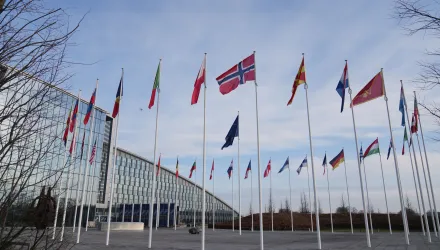One important outcome of the fourth and final Nuclear Security Summit (NSS) is that China, for the first time ever, joined six “gift baskets” and also made significant additional commitments. Most notably, China joined the 2014 gift basket on “strengthening nuclear security implementation” and agreed to a U.S.-Chinese joint statement on nuclear security cooperation.
In its national progress report on nuclear security delivered during the 2016 NSS, China announced it joined the strengthening nuclear security implementation initiative (SNSI). The SNSI, now signed by 38 states and introduced within the International Atomic Energy Agency (IAEA) as Information Circular 869 (INFCIRC/869), has been a major accomplishment of the summit process. By signing on to the SNSI, China pledges to follow IAEA nuclear security principles and guidelines in its national rules and regulations and allow teams of international experts to periodically evaluate its security procedures. This is an important step that will help China strengthen its nuclear security system and increase international confidence in that system.
China and United States also agreed to a joint statement on nuclear security. In the statement, they commit to intensifying cooperation to prevent nuclear terrorism and to continue advancing NSS goals. In particular, both countries declare they will conduct an annual dialogue on nuclear security (the first one took place in February 2016), which will provide an important forum for both countries to discuss and strengthen nuclear security cooperation.
Over the past decade, China’s significant progress on nuclear security has been one of the benefits of cooperation with the United States. The nuclear security center of excellence (CoE) in Beijing, which was commissioned in March 2016, was a U.S.-Chinese joint project initiated at the first nuclear security summit. Also, the conversion of a miniature neutron source research reactor from highly enriched uranium to low enriched uranium (LEU) in March 2016 was part of a U.S.-Chinese agreement initiated just after the first nuclear security summit.
Also in the statement, both countries commit to “continued engagement on nuclear security training and best practices to maximize the use and effectiveness of the COE.” China further commits to “sponsor training programs at the COE for regional partners and other international participants to further global nuclear security awareness and engagement.” Both the United States and China commit to continuing cooperation to convert China’s remaining MNSR at Shenzhen University to LEU, and other such reactors in Ghana and Nigeria. In addition, both countries pledge to cooperate to fight smuggling of nuclear materials and to strengthen cooperation on securing radioactive sources.
Among the six gift baskets China joined, the most important is on Sustaining Action to Strengthen the Global Nuclear Security Architecture, which establishes a “Nuclear Security Contact Group” made up of senior officials. This group will “routinely consult and synchronize national actions in support of the commitments” made during the NSS process. Additionally, China made commitments to countering nuclear smuggling, implementation of UN Security Council Resolution 1540, supporting an LEU fuel bank, supporting nuclear security training and support centers, and strengthening cyber security at nuclear facilities. This burst of activity from Beijing shows a distinctive switch in behavior compared with the previous three summits.
In short, China has substantially advanced its nuclear security during last several years. China’s commitment to nuclear security is now well established. There is, however, still room for improvement. As president Xi Jinping stated at the 2016 NSS, “the conclusion of the Nuclear Security Summit will not be the end of our endeavor, rather it will be the beginning of a new journey.” Converting those commitments into a sustainable reality will require China to take further steps that include incorporating new IAEA guidelines and cybersecurity protections in its new nuclear regulations and guidelines, using realistic “force-on-force” exercises at operating facilities, and expanding cooperation from civilian to military sector.
Zhang, Hui. “China Makes Significant Nuclear Security Pledges at 2016 Summit .” April 8, 2016





